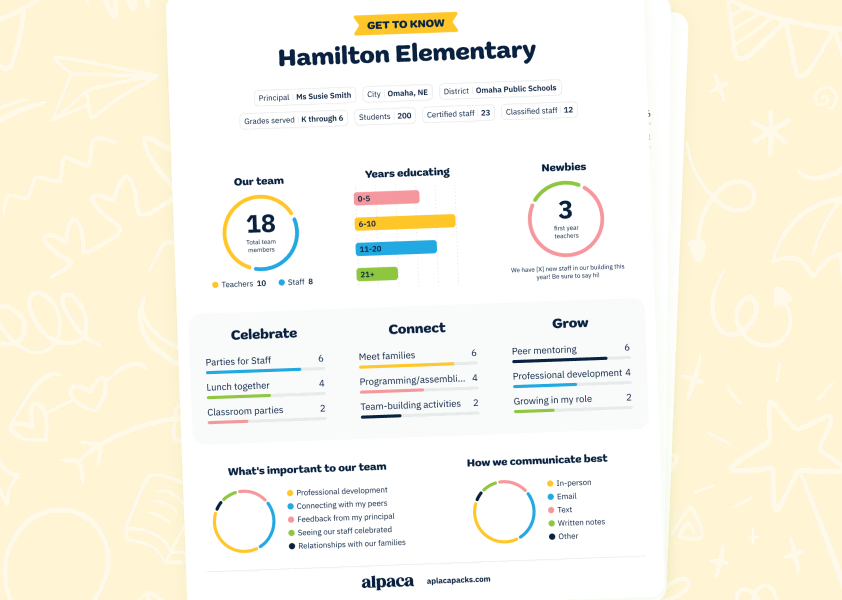Ask another way: 3 tips for more actionable staff survey data insights
%20(3).png)
Concerned about teacher morale? Don’t wait for your annual climate survey - try these three ideas for more actionable information, right now.
What does it mean if your staff morale is “-13%?” Or if your team is collectively a “3.5 out of 5” when it comes to their wellbeing?
If you’ve ever gotten the results back from a staff survey and wondered how to actually do anything about the indexes and numbers you see, then you know the frustration or helplessness that can result from traditional surveys. Many leaders take this as an opportunity to ignore or discount the survey data in front of them. If I don’t know what a “2.75” means, and it’s not actionable, then why share it?
Yet, teacher morale is on the top of every school leader’s mind right now. Not asking about staff morale isn’t an option. So instead, ask another way.
The purpose of a staff survey is to get an understanding of how your team is doing and what they need right now, so that you can act quickly. To accomplish that, try these three things:
1. Ask early and often.
If you find out in July that your team was desperate for more planning time back in March, you can’t do much about it. Traditional surveys for employees happen 1-2 times per year, often through a larger climate survey in the school or district. These surveys are very important, but they don’t give school leaders actionable information mid-year to support teachers.
That’s why employee engagement teams across the public and private sectors have embraced the concept of “pulse surveys” — simple, fast, single-question surveys that check in on some aspect of the employee experience on a regular basis.
2. Use real words.
“On a scale of 1-5, how would you describe your morale right now?” What educator can boil down their work to a 1-5 score?! It’s hard to reduce the complex work of being an educator to a number like this. Plus, many educators feel personally called to the profession, and saying “I’m a 1 right now” feels disloyal to the work.
Good news, you can ask another way. Instead of a typical Likert scale, try semantic scale surveying instead. This research-backed survey framework uses real words instead of number scales to help employees name their experience. Or, throw out rankings altogether, and simply ask “tell me how you’d describe work right now.” Or “what is one thing that would help you the most, right now?” If you’re simply using the answers to inform your own leadership, you don’t need the scales and scores.
3. Show your work.
What if the results are bad?! Right now, lowered employee morale for educators is no secret. But when those survey results reach your desk and you see that data about your teachers, it can feel personal, embarrassing, and even shameful.
Asking often (with real words!) can help, so that no single result is the be-all, end-all judgment of your work as a leader. Equally powerful is showing your team the results. Not every comment, and never in an attributed way, of course! But taking a moment at your team meeting to show your work in an actionable way makes everyone a part of the solution.
Consider the difference between saying “Our team is a 3.7/5” vs. saying “the top words we used to describe work last month were HOPEFUL, HOLDING ON, EXHAUSTED, STRESSED, and TOGETHER. I love seeing “together” because it means we’re here to help each other. What are your ideas about how we can collectively address our stress levels?”
Make no mistake — you don’t want to ditch your climate surveys anytime soon! There will always be an important role for the carefully constructed, scaled, and benchmarked surveys that support a thorough analysis of school climate and employee experience in our education systems on an annual basis. But if what you need as a school leader is a little information about how to help, right now, try utilizing pulse surveys, semantic surveying, and engaging your team in the results. You’ll get the information you need more quickly, and your team will get the support they need to be extraordinary at their work in educating successful students. And isn’t that what we’re here for?
Thinking about implementing pulse surveys at your school? Try a demo of Alpaca Pulse, our new survey tool that helps you learn more about your team and celebrate them personally. Hear from your teachers in their own words, every month, so that you can celebrate and support them in meaningful ways!


.png)

